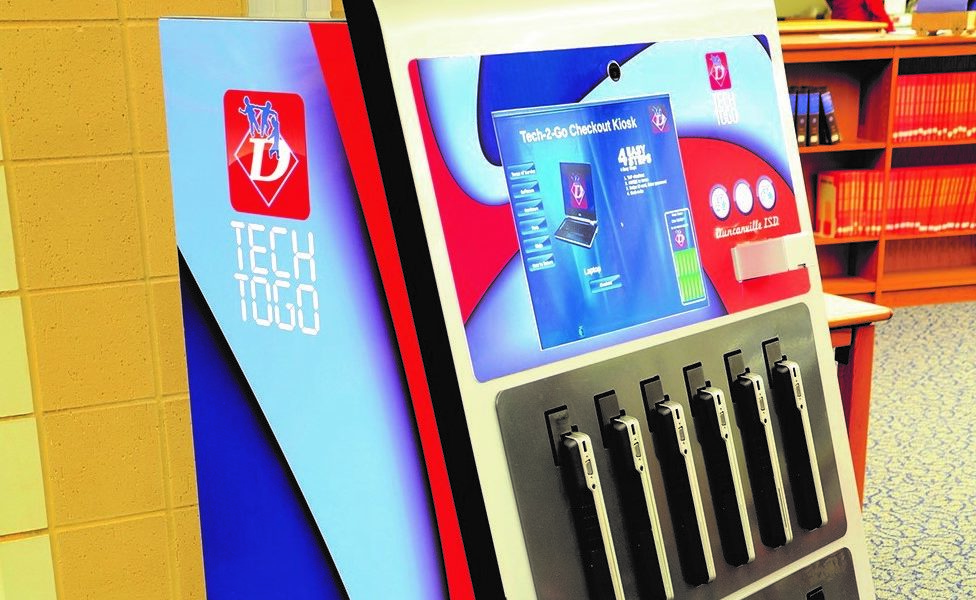Technology is a powerful—and often essential—tool for learning in today’s modern learning environments. With a laptop, tablet, or other Internet-connected device, students can access software and videos that allow them to learn at their own pace, connect with subject matter experts from around the world, collaborate with their peers using shared online platforms, and create and publish original works.
When students don’t have access to a digital device, their opportunities for learning are severely limited. For this reason, K-12 schools (as well as public libraries and higher-ed) have tried a number of approaches to ensure that students have access to technology when and where they need it.
Shared workstations in libraries or computer labs have their uses, but being tethered to a machine is not always a convenient way to work. Students want to be able to work in groups with their peers, or sit in a more comfortable chair, or take a device with them to class, or move to a quieter area to focus on their studies.
What’s more, many institutions would prefer to reclaim the space they have carved out for shared workstations and use it for other purposes.
Mobile device lending programs can address these concerns, but they raise issues of their own. Checking devices in and out, and making sure they’re fully charged and in good working condition between usage, can take up many hours of staff time if these chores are handled manually.
Fully automated dispensing kiosks solve these challenges. Like a vending machine that dispenses laptops, the company’s solution allows students or library patrons to borrow nearly any type of laptop device at all hours of the day, without the overhead required by a manual checkout desk.
This self-service approach is transforming technology use in K-12 schools, libraries, colleges, and universities, leading to more equitable learning opportunities for everyone.
High School Supplements BYOD Program with Laptop Kiosks
At Duncanville High School in Texas, a Bring Your Own Device (BYOD) program allows students to use their personal laptop, tablet, or smart phone for learning. But there are some students in this school of nearly 4,000 pupils who don’t own a digital device. And for students whose only device is a smart phone, writing an essay or producing other content can be challenging.
The library has laptop carts that teachers can borrow for instruction, but leaders wanted to give individual students the opportunity to borrow laptops to complete their schoolwork, as well. A few years ago, they installed a 12-bay laptop dispensing kiosk in the high school’s library. The kiosk proved to be so popular with students that the school has since added a second 12-bay kiosk to meet the demand.
From August 2018 through April 2019, the two kiosks seamlessly handled nearly 3,000 laptop checkouts.
Students can borrow a laptop by scanning their ID badge and typing their network password into the console. The kiosk takes a picture of them in case there is a problem, and it requires them to read and agree to the terms of service.
Once students promise that they will use the device responsibly and will return it by the end of the day, the kiosk dispenses a laptop. Students return a laptop by simply inserting it into one of the empty bays. The kiosk automatically recharges the device and returns it to its original pre-set state.
A Win-Win for Students and Administrators
The kiosks can be programmed to fit whatever local policies that institutions desire. They integrate with an institution’s authentication database to verify the identity of users, and administration on the back end is minimal.
When a laptop is pushed back into an empty bay in the locked position, it is docked to a power source so that it can recharge automatically. What’s more, institutions can opt to license Deep Freeze or a similar program for restoring the laptop to its initial state.
The laptops communicate their presence through an RFID card reader built into every bay, and they also communicate their battery life to a central server. A laptop will only be checked out when it exceeds the minimum battery life established by the institution.
Automatic notifications help administrators manage the laptop dispensing program as needed. For instance, an administrator can receive notification for late returns, bays that fail, or devices identified by end users as requiring service.
Administrators can also go online to view usage reports and logs of every event that has occurred at a kiosk. All transactions are recorded by a camera that is built into each kiosk, so administrators can identify users by face if there are any problems.
Another unique feature is that the kiosks will distribute laptops to users on a rotating basis, so that all devices receive similar usage. This helps prevent some devices from receiving more wear and tear than others.
Kiosks can accommodate enterprise-quality laptops from all leading vendors, as well as select Chromebooks and iPads.
Institutions are responsible for purchasing the devices, and the company will deliver kiosks that can handle whatever many of the popular devices an institution deploys—complete with customized graphics, oftentimes in the same system.
Custom kiosk graphics help brand the service to their institution and do a great job of promoting the self-service program to their user community.
User surveys and data from usage reports suggest the programs are transforming users’ computing experience—giving them easy access to flexible, mobile computing tools without creating an additional burden for administrators.
LaptopsAnytime’s Automated Laptop Dispensing Kiosks are modular, configurable and custom branded stations that are used to dispense wide range of laptop models to students on-demand, www.laptopsanytime.com.








